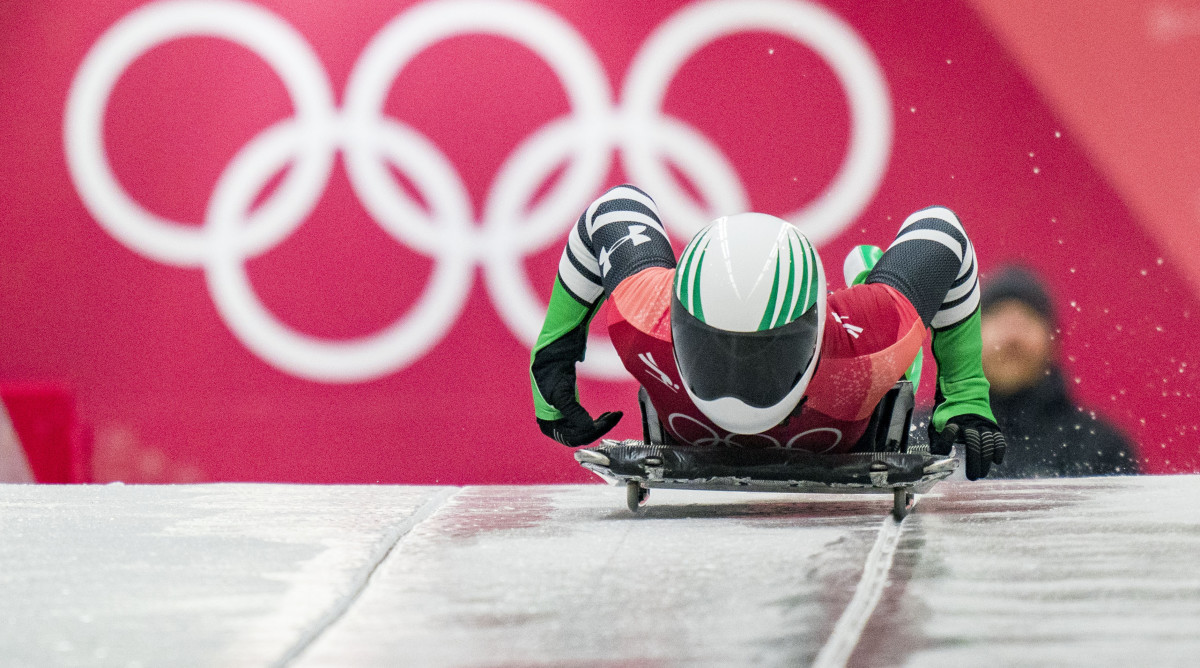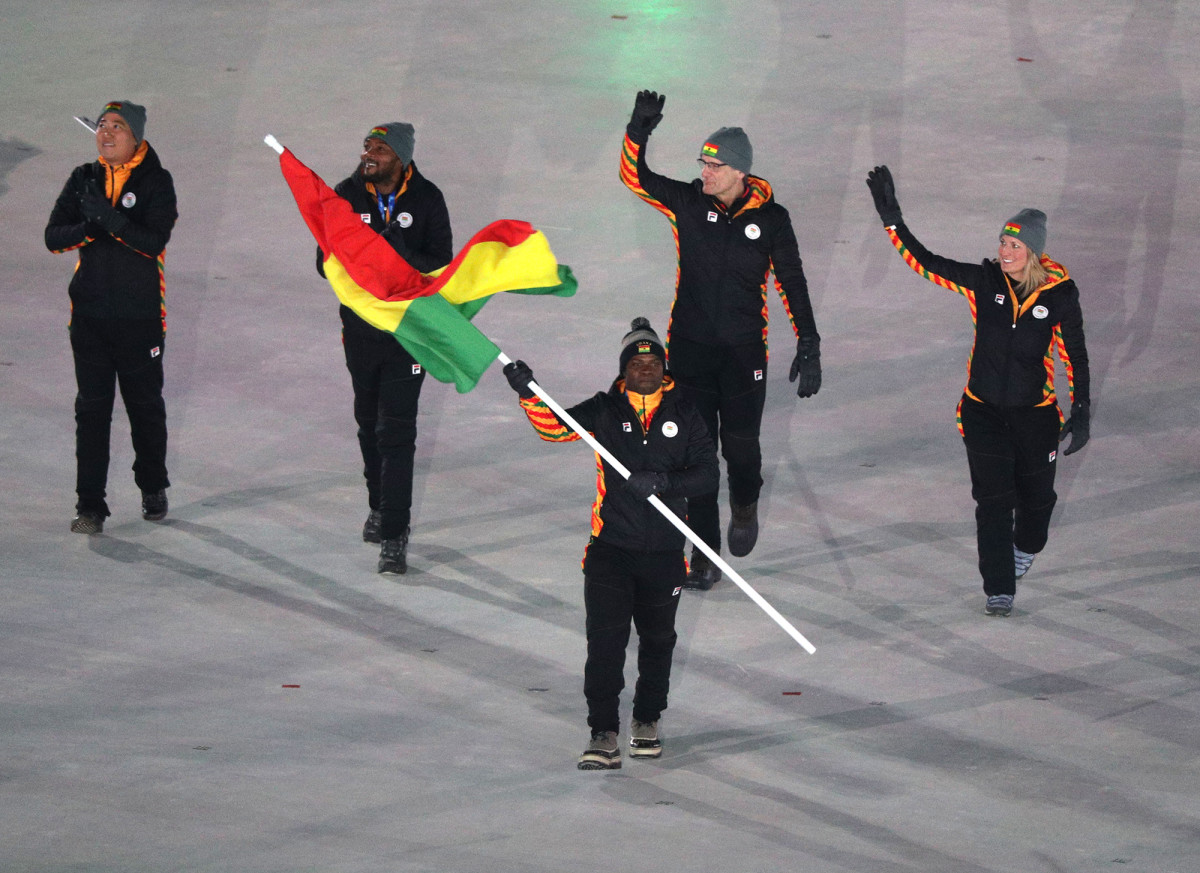The IOC’s Quota Decision for Beijing Sends a Message to Black Winter Olympics Athletes
The guest of honor danced into camera view to a Nigerian afrobeat track, green beads in her braided hair and a bouquet of white balloons overhead. A green and white Nigerian flag hung on the wall behind her, framing an array of trophies, plaques, medals and her racing bib from her history-making skeleton run at the 2018 Winter Olympics. A towering green-and-white cake bore a warm message in frosting:
CONGRATULATIONS SIMIDELE
TEAM NIGERIA
And yet, of the 75 or so family members, friends and other loved ones who gathered over Zoom on that Sunday in late January, none actually knew the reason behind why they were congratulating Simidele Adeagbo. For more than an hour they watched a slideshow of pictures from her youth. They took turns sharing words of encouragement. They laughed and cried. But was it a sendoff? A comedown? What?
“It was bittersweet because we were still awaiting the official news,” Adeagbo, 40, says. “[But] I had made a promise to myself: No matter the outcome, I was going to be proud and celebrate anyways.”
At the time, Adeagbo was holding out hope of receiving a last-minute invitation to the 2022 Beijing Games, after her qualifying time landed her on an alternate’s list. A day later, though, she was finally informed that—despite her recent victory at the women’s Monobob World Series in Winterberg, Germany, where she became the first-ever African slider to win gold at an International Bobsled and Skeleton Federation-sanctioned event—she had missed out by a single spot. The close shave stung, and not only because of what it personally meant to Adeagbo. As she says, “Once I got confirmation, I had to accept it, and channel that disappointment to use my voice to help drive change.”

Four years ago, a record eight African countries sent athletes to PyeongChang, including Adeagbo and Ghanaian Akwasi Frimpong, the first Black man to compete in skeleton. Although none came close to medaling—Adeagbo and Frimpong both finished last in their fields—the headcount alone was heralded as vital progress for a place with neither the climate nor the resources typically required for winter sports success. But once the cauldron is lit in Beijing this week, only six athletes from five African delegations are slated to appear in action, all of them alpine and cross-country skiers.
At the core of the decline is the concept of the continental quota. Adeagbo and Frimpong qualified for the last Olympics through this system, meeting certain baseline performance standards before receiving a final boost to the global stage in the name of diversity and inclusion. But for reasons both sliders cannot explain, the IBSF and the IOC have since opted to revoke the mandatory representation for the Beijing Games, leaving Adeagbo, Frimpong and other marginalized sliders out in the cold.
For Adeagbo and Frimpong, the problem isn't that they were personally excluded from returning; both acknowledge that they understood the rule change and fell short under its new parameters. Rather, it is about the larger message they feel it sends for the Olympics to preach a movement of equality while simultaneously rejecting calls to help those who need it most. “When people are watching the Olympics, they want to see representation,” Adeagbo says. “I think this will have an unfortunate impact. I hope it doesn’t discourage others, but if anything, it’ll show how difficult it is to get there.”
The odds are stacked against any winter sports athlete from Africa, which didn't see its first Black entrant until Senegalese skier Lamine Gueye in 1984 and is still waiting for its first medalist. But this is especially true for sliders, who must overcome a host of environmental and economic difficulties just to get into the Games. Elite equipment is prohibitively expensive, with Adeagbo’s IBSF-mandated monobob running her about $40,000. Quality coaching and dedicated training time are difficult to pin down without the backing of a big national federation. Dreams die far more often than they are realized. “People will never understand the uphill battle that we face just to participate," Frimpong says.

Frimpong is the perfect example. Born and raised in Ghana before moving to the Netherlands as a boy and later starring on the track and field team at Utah Valley University, he started out selling vacuums door to door to raise money for his fledgling Olympic skeleton dreams. “Working from 8 a.m. to midnight, people slamming doors, spitting in my face,” Frimpong says. And in the wake of PyeongChang, where his inspirational story rocketed him to viral fame, flagging finances forced him to borrow money just to hire his first coach, former U.S. skeleton racer Zach Lund. “It’s not that we’re less talented,” Frimpong says. “We don’t have the dedicated infrastructure. We don’t have the knowledge. It takes support.”
Aside from Lund and fellow coach Brian McDonald—both of whom are now in part-time roles, as Frimpong can’t afford to shell out full-time salaries—Frimpong operates as a team of one. He is the strength coach and the nutritionist, the masseuse and the chiropractor, even the founder of Ghana’s bobsleigh and skeleton federation. “And when it's just you, patching things together, you don't get any consistency,” McDonald says. “He's so far behind the eight ball in terms of what other programs have.”
Adeagbo is in a similar position, relying on corporate speaking and consulting gigs to earn enough money for travel, track reservations and other expenses. But for as hard as she has toiled to reach the top, it can sometimes feel like the rest of the world isn't taking notice: When Adeagbo stepped onto the medal podium after her Winterburg win, she discovered that event organizers had neither a Nigerian flag to raise nor a recording of the Nigerian national anthem to play. (Fortunately she brought along her own flag, the same one that later appeared in the backdrop of her Zoom part, out of habit. “I don’t know where that started, I just always have it,” she says. “I feel like it comes from deep down, being in this sport where there’s not a lot of representation. I want the continent to be seen.”)
Adeagbo also points out the added challenges posed by a stark gender disparity in sliding sports, even with the introduction of monobob, the lone women-only event in Beijing. “I think the intention was to create more opportunities for women, but unfortunately, the way the current rules are, 14 out of the 20 women who go to the Olympics have to come from two-women bobsled,” she explains. “So they really opened up six spots for people like me who focus exclusively on mono.” As it is, the Yanqing National Sliding Centre is poised to host nearly triple the number of male bobsled athletes (124) as women (46). “Making sure we can find a way for gender equality, that to me is very relevant,” Adeagbo says.
Given how far Adeagbo and Frimpong have come in their short time in sliding—the former, a four-time All-American triple jumper at Kentucky, knew next to nothing about the sport before picking it up less than four months before PyeongChang; the latter is currently ranked 63rd in the world and barely missed qualifying for Beijing thanks to a series of positive COVID-19 tests around Christmas—it is natural to wonder how much more they could accomplish with a truly level playing field. “We are here to stay,” Frimpong says. “We're not here to joke around and get written about just because we’re from Africa.”
But so far their attempts to get answers about the end of the quota system have been met with confusing results. In a February 2020 email to Frimpong obtained by SI, IBSF officials pinned the decision on a desire to confirm its qualification criteria “to the standards of other International Federations.” A more recent email, from IOC sports director Kit McConnell to Lund and McDonald, put the blame squarely on the federation, writing that the new procedures were “proposed and approved by the IBSF in 2019" and that “giving an athlete a quota place which is not according to the qualification criteria would consequently imply the exclusion of another athlete qualified in the current qualification system.”
Frimpong rejects this framing. “You have a group of people who come from a continent that are 100 years behind in development,” he says. “I don’t know if [the IOC and IBSF] really sat down to think of it in that way. Out of the five continents represented in the Olympics rings, Asia, Oceania, Europe and America will be in sliding sports in Beijing. We're not asking to take any athlete's spot. Just add Africa.”
But despite an eleventh-hour blitz of media appearances and additional letters, the best Frimpong has gotten is an assurance that members of Ghana’s Olympic committee will meet with IOC president Thomas Bach in China to discuss the issue ... some 10 days after the Opening Ceremony.
"The scary part is, if no one from an African nation gets to turn on their TV to see someone from Africa competing, that chance may be gone from sliding sports for a long time,” McDonald says. “The next guy or gal, maybe they have talent but they’re not as resourceful or have no support.”
All of which has left Frimpong, in his words, “broken but not shattered.” He is 35 now, faster and stronger than ever thanks to more consistent coaching (from Lund and McDonald), training (10 weeks in Russia last summer, followed by three in China, all brokered by Frimpong through his connections), and sponsorship (the Swiss sportswear company On recently released an eight-minute biographical film on Frimpong called “Black Ice,” which received 600,000 views in six days). But he also has two young daughters, ages 4 and nine months, and a wife to consider back home outside Park City, Utah. “Sometimes we have to decide: Pay rent, or go to Germany to compete in a skeleton race?” he says.
Adeagbo, who is based out of Charlotte, plans to dedicate her free time to setting up the Simi Sleighs Foundation, a grant-based nonprofit that will support elite female athletes. It’s too soon to start thinking about making a run at the 2026 Winter Olympics in Italy, she says, though she does not rule it out either. “I know that I have endless possibilities as an athlete,” she says. “I met my objectives this season, and that was to become the best bobsledder I could be. Lots to be proud of, lots to build on.”
Asked whether she plans to tune into the NBC broadcast to watch her peers compete, Adeagbo balks. “We'll see,” she says. “I congratulate the women who did qualify. Many I’ve raced with, trained with and I want to do well … [But] this is a process, right? I think the emotions will come in waves.” She expects the experience to be bittersweet, sitting on her couch when she should be sliding forward.
More Olympics Coverage
• SI Picks Every Medal at the 2022 Olympics
• How Do Figure Skaters Choose the Music For Their Routines?
• For Outdoor Winter Olympians, Combating the Conditions Is Critical
• How the Artificial Snow Was Made for the Beijing Olympics
